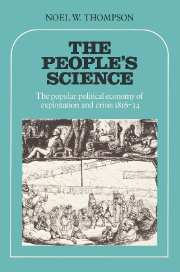Book contents
- Frontmatter
- Contents
- Preface
- Introduction
- 1 Changing attitudes to political economy in the working-class press 1816–34
- 2 The need for a working-class political economy
- 3 Charles Hall and Robert Owen: anti-capitalist and socialist political economy before the Ricardian socialists
- 4 Ricardian socialists/Smithian socialists: what's in a name?
- 5 The theory of labour exploitation and the working-class press 1816–30
- 6 The theory of labour exploitation and the working-class press 1830–34
- 7 Early socialist political economy and the theory of capitalist crisis
- 8 The popular political economy of crisis 1816-34
- Conclusion
- Bibliography
- Index
1 - Changing attitudes to political economy in the working-class press 1816–34
Published online by Cambridge University Press: 14 January 2010
- Frontmatter
- Contents
- Preface
- Introduction
- 1 Changing attitudes to political economy in the working-class press 1816–34
- 2 The need for a working-class political economy
- 3 Charles Hall and Robert Owen: anti-capitalist and socialist political economy before the Ricardian socialists
- 4 Ricardian socialists/Smithian socialists: what's in a name?
- 5 The theory of labour exploitation and the working-class press 1816–30
- 6 The theory of labour exploitation and the working-class press 1830–34
- 7 Early socialist political economy and the theory of capitalist crisis
- 8 The popular political economy of crisis 1816-34
- Conclusion
- Bibliography
- Index
Summary
The attitude to political economy of writers in the radical press of the immediate post-Napoleonic War period embodies a strong anti-intellectualist strain. This anti-intellectualism is most apparent in Cobbett's Weekly Political Register but it also finds expression in such papers as Richard Carlile's Republican and, to a lesser extent, T. J. Wooler's Black Dwarf. Cobbett in particular would seem to have had little time for political economy judging from his acerbic castigation of its leading theorists. His condemnation of them was unhesitating, unqualified and liberally spiced with personal abuse. Thus addressing one issue of his paper to Malthus, ‘that impudent and illiterate Parson’, he stated with pungent simplicity, ‘I have during my life detested many men but never anyone so much as you.’ Smith was dismissed with similar contempt as ‘verbose and obscure’; a writer who took care to hide the implications of his theories ‘from vulgar eyes’; while Ricardo was the butt of a continual stream of virulent, anti-semi tic rhetoric that does not bear repetition.
Nevertheless, it must be emphasised that readers of Cobbett's Register and other radical journals were not dissuaded from all attempt to make order out of the seeming chaos of the economic world. Cobbett might loathe the political economists and their reification of human relationships but he was not entirely averse to explicating those laws and forces which he saw as governing the economic fate of the working man.
- Type
- Chapter
- Information
- The People's ScienceThe Popular Political Economy of Exploitation and Crisis 1816–34, pp. 8 - 34Publisher: Cambridge University PressPrint publication year: 1985



